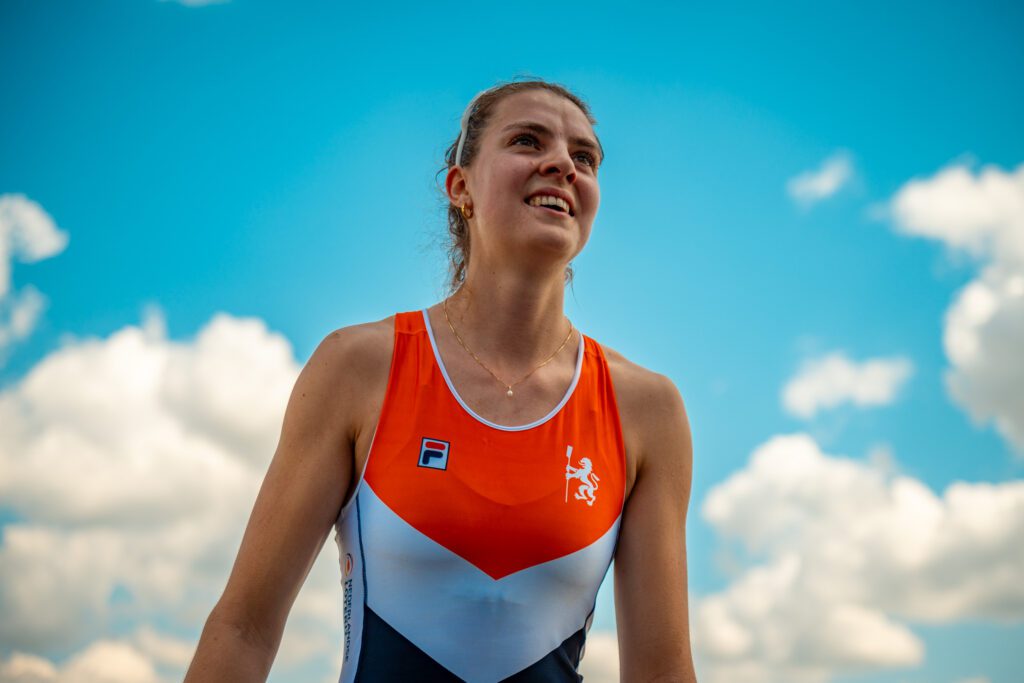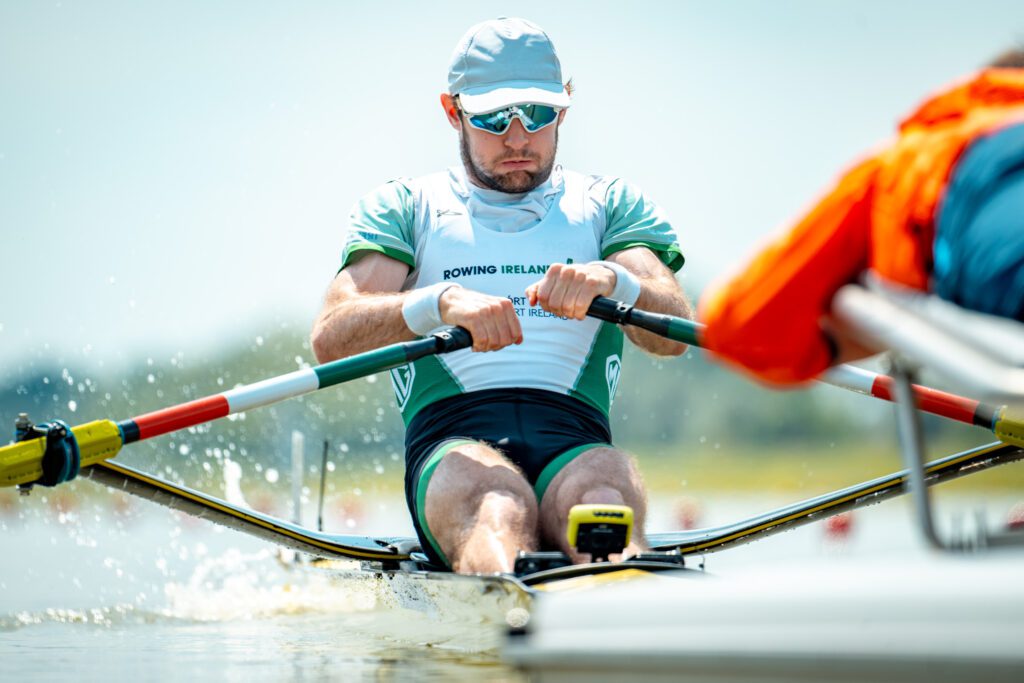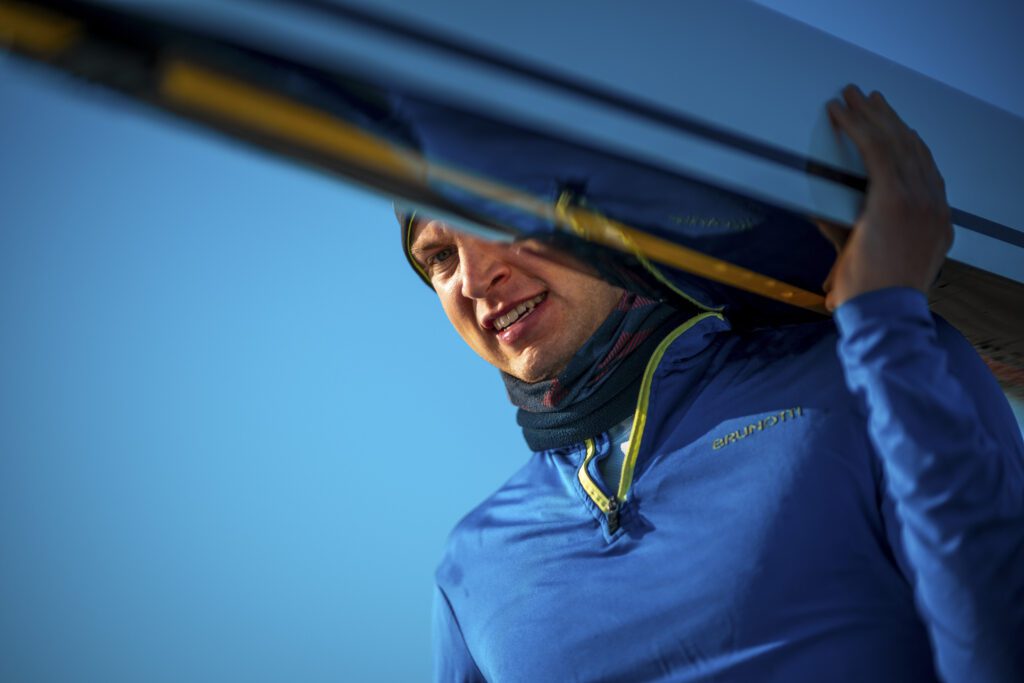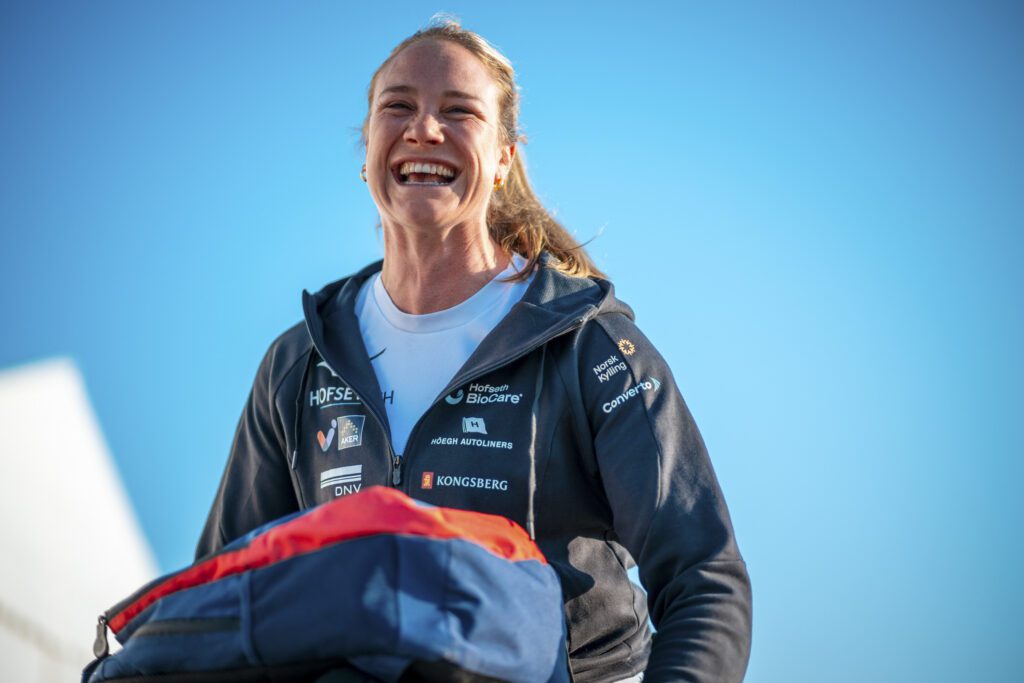Habitual attendees at World Rowing championships know that the ebb and flow of success on finals days are marked by anthems, and it’s easy to get bored of those which become earworms. One commentator, asked to sum up Saturday, described it as “Well, I’m tired of the Dutch anthem, I’ve never been fond of the British anthem, and I’m starting to go off the Irish one….” True, the only time Ireland’s ‘Amrán na bhFiann’ was played was for lightweight superstars and holders of the chattiest interviewees award, Fintan McCarthy and Paul O’Donovan, who duly won again the event they have owned since 2019. But behind that was a grand total of seven Olympic and Paralympic crews qualified for Paris, making next year’s the biggest ever Irish Olympic rowing team.
The Dutch-British rivalry was greatest in the last four races of the day, with the two countries sharing the fours and quads titles. The Dutch claimed a confident win in the women’s four but fell short on the men’s as the USA and Ireland marched into the medals behind victors Britain. The latest iteration of a British women’s quad, which has shown real promise this season, then pulled a blinder to deliver GBR its first world title in this event since 2010, upsetting the Dutch apple cart. And then normal Netherlands service was resumed by a peerless men’s quads win for the men in orange, while it was Britain’s turn to miss out and come fourth. Surprisingly nobody swam to meet the Dutch champions, but World Rowing have got wise to such tricks.
It was a rollercoaster day which first came to a head in the morning as the B-finals decided Paris qualification for another eight events. The men’s and women’s pairs were five crews to qualify, the rest of the events only one, leading to some decidedly nervy moments for the large crowd of keen spectators. One of the tightest B-finals was the lightweight women’s doubles, stuffed full of high-achieving crews including two of the three Tokyo medallists, the current under-23 champions and last year’s bronze medallists.
Ireland’s Margaret Cremen and Aoife Casey made most of the moves but were only leading by a few feet when main challengers and Olympic silver medallists France caught a brief but costly crab at 1750m gone, and grabbed their chance to win while France dropped to fifth. The 2024 Olympic hosts, along with Italy’s Tokyo champions (who are coming back from injury) will now have to try and gain a Paris place at the Final Qualification Regatta next summer, or won’t be representing their countries at the Games in the last ever LW2x Olympic race. “We were really gunning for it this time”, said Cremen. “We went through the Final Olympic Qualification Regatta last time and we were all guns blazing for the [B]-final.”
The lightweight men’s qualification went to Mexico, the first ever time they have qualified an Olympic boat at the preceding worlds (though they have had a number of Olympic crews, most notably a squad of six boats at their home 1968 Games back when qualification wasn’t required). Romania, fed up with losing key semi-finals earlier in the week, had a resurgence, claiming the men’s fours and men’s quads spots, while Germany’s women restored national pride and hearked back to an earlier dominant era by winning the W4x B-final in style over Ukraine and claiming Paris tickets. “It means a lot to go into next sesason to have qualified”, said German sculler Tabea Schendekehl. “It’s a huge weight off our shoulders.” Marian Enache of the Romania quad was positively lyrical after their B-final win. “For Romania this is the first quad to qualify in history, to go to the Olympic Games. Life is measured in steps. We are sometimes like a lion, when we are hungry we roar.”
It’s hard to remember after so many European and world cup medals including gold for the red-yellow-blue brigade that some recent Romanian crews have found it very difficult to convert early-season speed into championship metalware at the end of the summer. So bronze for Ioana Vrinceanu and Roxana Anghel was a watershed result, their first medal at a senior worlds, behind a Dutch dethroning of the Australian champions from Varese and Lucerne, who also hold fours golds from Tokyo. Visibly disappointed, Jessica Morrison and Annabel Mcintyre had been outrowed by the Dutch, who held all the cards from early on.
Two more Paralympic medal slates were decided, the British claiming both. Sculling revelation Gregg Stevenson, who must have learned his trade the fastest of any para-rower, under the tutelage of double Paralympic champion Lauren Rowles, celebrated his 29th birthday with a gold medal in one of the hardest PR2 doubles races of all time, the British having gone toe to toe with China the entire way down the whole course. The British mixed four were also pressed hard, this time by the USA, but inexorably took gold, making this the twelfth world or Olympic title in an unbroken row. “I’m actually very shaky”, said cox Erin Kennedy after regaining the world gold. “That’s the race you dream about. It’s amazing to have the field so close and pushing us. We had to row our absolute best.”
The USA also managed to make useful trouble for others in the lightweight women’s doubles and men’s fours, their newly reselected combination of Michelle Sechser and Mary Jones coming through the pack like a steam train to push aside Canada and Romania while Britain’s Imogen Grant and Emily Craig retained their title. “You’ve got the top lightweights from every single nation just fighting it out every time and no-one’s going to give anyone an inch”, said Grant afterwards. “It’s just a privilege to be racing against so many incredible women.” The US men’s four wreaked rampant havoc along with New Zealand, as they had in the semi-final, but the British men saw them coming and serenely motored on to a second win in a row, though having to work to their limit, while the Dutch and Australians missed out.
The other very happy country on Saturday was Switzerland, whose men’s pair of Roman Roeoesli and Andrin Gulich elegantly duffed up the British world cup champions, and whose lightweight double took silver behind the ever-extraordinary Ireland. In the pairs race it was obvious the British had been on the watch out for the Romanians and Swiss, particularly after the latter’s display of prowess in the European championships, but Irishmen Ross Corrigan and Nathan Timoney seized a quick lead which disrupted the three form crews in the early stages. It was the Swiss who made a more effective move, shifting away from 2022 champions Romania and overtaking Brits Tom George and Ollie Wynne-Griffith to seize the win, leaving GBR second and Ireland third. “Finally world champion”, said Roeoesli. “I competed at worlds since 2013, so of course I tried every year and in the beginning it was almost impossible. Now we finally did it, I’m so happy.”
There is something slightly sad in the knowledge that we have now seen what is likely to be the last seriously contested lightweight doubles world championship races. Certainly they’ll never be raced at the worlds weekend again, or with so many crews of such high quality, even if LM2x and LW2x stay on the World Rowing programme beyond Paris. The 2023 champions, Ireland and Britain, rank alongside the best in history, and are worthy wearers of the final lightweight worlds crowns.



